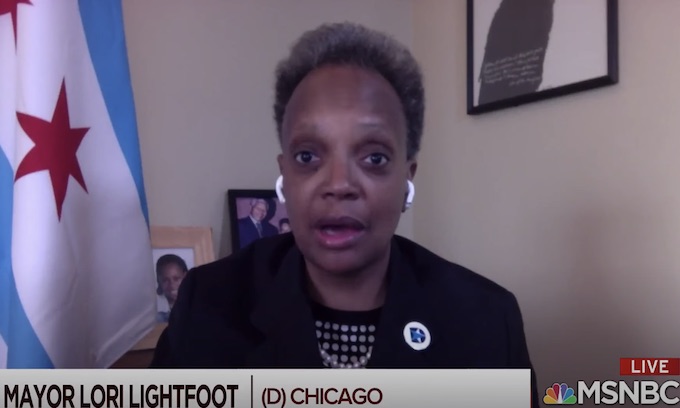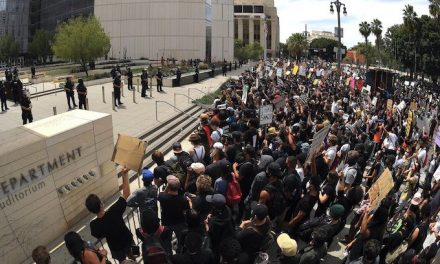As Mayor Lori Lightfoot works behind the scenes to muster the votes she needs to pass her 2021 city budget, she has delivered a message to City Council members: those who vote against her spending plan should not expect their wards to be prioritized, according to aldermen.
In recent weeks, Lightfoot has held a series of meetings with aldermen during which she’s lobbied for their support on her controversial spending plan, which includes a $94 million property tax increase this year and annual bumps in the future, hundreds of city employee layoffs and a gas tax hike. The mayor’s budget also relies on increased money from fines and fees, including a plan to ticket people caught by electronic speed cameras going 6 mph over the limit.
Though the budget’s property tax increase is smaller than feared, her administration has been working frantically to secure the 26 votes needed to pass her spending plan.
As part of her efforts, Lightfoot met virtually Wednesday with members of the City Council Black Caucus, where she made waves by telling them that aldermen who don’t support her budget won’t have their wards prioritized, according to six aldermen who were in the meetings.
“Don’t come to me for s— for the next three years” if you don’t support the budget, two aldermen recalled her saying.
In response to questions about the mayor’s remarks, Lightfoot spokeswoman Anel Ruiz did not dispute the comments but said in a statement that closing the city’s $1.2 billion budget deficit “requires sacrifice on the part of every single member, not just some.”
“Black aldermen have repeatedly told the mayor that for years, they have stepped up, taken the hard votes, and then had nothing to show for it. The mayor is committed to addressing these past wrongs as she has throughout her tenure through investments on the south and west sides,” Ruiz said. “It is fundamentally unfair for some to step up, bear the burden and then for others who chose not to take tough votes to have the same expectations of receiving taxpayer dollars that they are unwilling to support through revenue votes.”
City Council members weighing “no” votes on budgets often worry about losing support for projects in their wards, but some aldermen were surprised by the mayor making the threat so directly.
The comments, though, mirror Lightfoot’s combative approach to aldermen who voted no on her 2020 budget, which passed 39-11. After the vote, Lightfoot launched a website shaming Chicago aldermen who voted against her first budget, casting it as a civic tool for the public despite criticism that it was petty and bullying.
This time around, some North Side aldermen and others who represent majority white wards have expressed concern about supporting property tax increases. Raising property taxes is always politically fraught for North Side aldermen but some are especially concerned due to rising tax bills caused by Cook County assessor reassessments.
In another attempt to build support for her budget, Lightfoot also has approached the Latino Caucus to remove exceptions in Chicago’s Welcoming City ordinance, the city’s sanctuary law, that allow police to cooperate with federal immigration authorities under limited circumstances. The city’s welcoming ordinance has been criticized by activists for years due to such allowances.
The move is being pitched as a budget sweetener to help secure their support, though some Latino aldermen have balked at it being included as part of the budget. The Latino caucus is against the move, which some members see as a cynical attempt to wrangle votes, Ald. Carlos Ramirez-Rosa, 35th, said.
“While I’m happy that the mayor has decided to finally act on this Welcoming City amendment that’s been sitting before her for a year now, it’s not right for her to hold it hostage in the budget in order to extort votes for her property tax increase,” he said.
At an unrelated news conference, Lightfoot was asked about the carveouts being part of the budget and cast it as an attempt to fulfill a campaign promise.
“If you don’t support it, if you don’t think that our immigrant and refugee community deserves protection, you’ll be on record as casting your vote against that but I think many people understand this is really essential to the essence of who we are as a city,” she said.
Earlier in the week, Lightfoot signaled optimism about her budget vote, telling reporters she thinks her administration is “getting very, very close.”
But Lightfoot has struggled to lock in a majority for the budget.
As first reported in the Tribune, Lightfoot’s approach to closing a projected $1.2 billion hole relies on a 3-cent gas tax hike and a $94 million property tax increase. It also includes a provision to raise property taxes annually thereafter by an amount tied to the consumer price index. That could prove agreeable to aldermen, who wouldn’t have to take as many deeply unpopular votes on such increases.
In addition, Lightfoot is asking to refinance $501 million in city debt, which would provide a jolt of new revenue next year, but likely cost taxpayers more down the road. Similar borrowing tactics under Mayors Richard M. Daley and Rahm Emanuel drew deep criticism, but the Lightfoot administration said the city’s current financial disaster makes such a move appropriate.
Lightfoot has tried to head off opposition to the property tax hike and spending plan, calling it a “modest” increase and arguing that she’s taken other measures to reduce the hit on taxpayers.
“Some had predicted that this budget would be predicated on hundreds of millions of new property tax dollars. Not so,” Lightfoot said last month. “And for the average Chicago home valued at $250,000, you will pay just 56 additional dollars for the whole year. That’s right, just 56 new dollars per year.”
But whether aldermen whose constituents’ finances have been walloped by the pandemic-fueled economic downturn agree with the mayor remains to be seen.
___
(c)2020 the Chicago Tribune
Visit the Chicago Tribune at www.chicagotribune.com
Distributed by Tribune Content Agency, LLC.
—-
This content is published through a licensing agreement with Acquire Media using its NewsEdge technology.



















Recent Comments